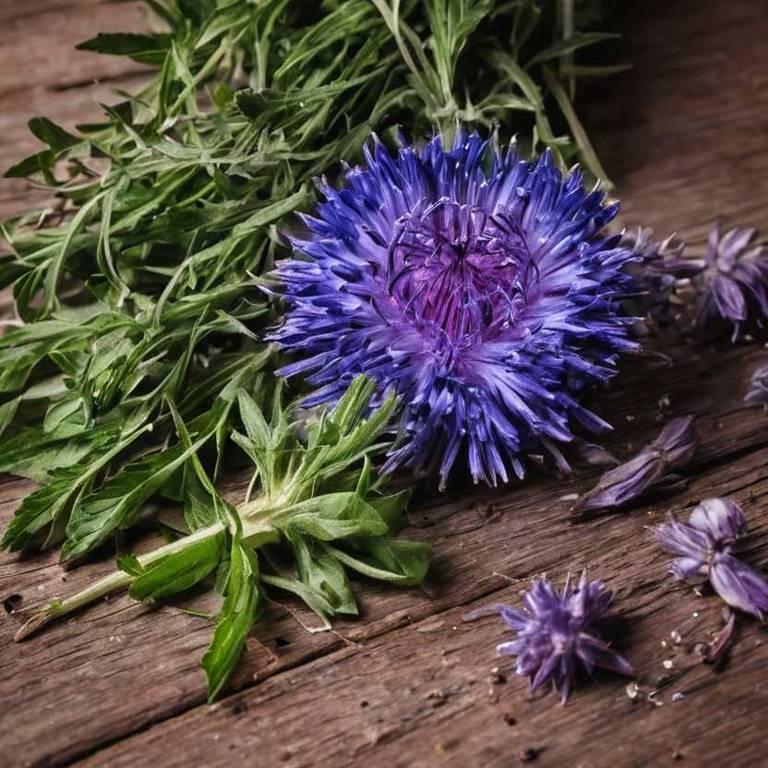Blueweed (Centaurea cyanus)
Blueweed (Centaurea cyanus) is a member of the Compositae family, native to Europe, Asia, and North Africa. Traditionally, its flowers, seeds, and leaves have been used for infusions, decoctions, and powders.
This herb is particularly valued for its anti-inflammatory, diuretic, and bitter actions, and has a long history of use in european herbal medicine, mediterranean herbal traditions, and traditional chinese medicine.

Quick Facts / Key Information
| Common Name | Blueweed |
|---|---|
| Scientific Name | Centaurea cyanus |
| Plant Family | Compositae |
| Genus | Centaurea |
| Species | cyanus |
| Native Range | Europe, Asia, North Africa |
| Plant Parts Used | Flowers, Seeds, Leaves |
| Primary Medicinal Actions | Anti-Inflammatory, Diuretic, Bitter |
| Primary Traditional Systems | European Herbal Medicine, Mediterranean Herbal Traditions, Traditional Chinese Medicine |
| Historical Preparation Methods | Infusion, Decoction, Powder |
Botanical Identity
- Scientific Name
- Centaurea cyanus
- Common Name
- Blueweed
- Synonyms / Alternative Names
- Bachelor'S Button, Cornflower, Cupid'S Bow
- Plant Family
- Compositae
- Genus
- Centaurea
Botanical Description
- Growth Habit
- Annual herbaceous plant.
- Height
- It typically grows to a height of 30 to 100 centimeters.
- Leaves
- Lanceolate leaves with glaucous upper surface and paler lower surface, bearing prominent stomatal bands along the midrib.
- Flowers
- Flowers are blue to violet with five petals arranged in a radial symmetry, typically solitary or in clustered inflorescences, featuring a central yellow disk surrounded by ray florets with prominent white veins.
- Stems
- Erect, unbranched, glabrous, herbaceous stems with alternate leaves and prominent, sparsely hairy phyllaries.
Traditional Uses / Historical Use
Traditional Systems
- European Herbal Medicine
- Mediterranean Herbal Traditions
Historical Preparation Methods
- Infusion
- Decoction
- Powder
- Poultice
Medicinal Actions
- Anti-inflammatory
- Historically regarded as a mild anti-inflammatory, in tissue-soothing contexts.
- Diuretic
- As described in traditional systems, a warming diuretic, in fluid-regulation contexts.
- Bitter
- In herbal literature, noted as a calming bitter, in taste-driven classifications.
- Tonic
- Commonly referenced as a gentle tonic, for long-term use contexts.
Active Compounds
- Flavonoid
- Naturally occurring polyphenols that contribute to pigmentation and structural chemistry.
- Anthocyanin
- Naturally occurring compounds contributing to plant pigmentation.
- Phenolic Acid
- Simple phenolic molecules widely distributed across plant tissues.
- Coumarin
- A class of aromatic organic compounds found in many plant species.
Modern Research Overview
Contemporary research on this plant includes areas such as chemical analysis, laboratory-based studies, and observational research. Detailed summaries of published findings are not included at this stage and will be added during future content updates.
Safety & Contraindications
- General Precautions
- Precautionary considerations have been reported in relation to this herb.
- Contraindications
- There is insufficient evidence to determine specific contraindications related to this herb.
- Allergies
- There is insufficient evidence to determine whether this herb commonly causes allergic reactions.
- Drug Interactions
- The potential for interactions with prescription medications has not been extensively studied.
- Toxicity
- The toxicity profile of this herb has not been clearly established.
- Pregnancy & Breastfeeding
- Information addressing pregnancy and breastfeeding-related safety for this herb is limited.
Preparation & Usage Methods
- Infusion
- Water is poured over plant material and allowed to steep before straining.
- Decoction
- A preparation method involving prolonged boiling of roots, bark, or dense plant material.
- Poultice
- This method uses direct contact between plant material and the skin.
- Powder
- Dried plant material is ground into a fine powder.
- Culinary Use
- Culinary use includes adding plant material to recipes or beverages.
Growing, Harvesting & Storage
Growing / Cultivation
- Soil
- Prefers loamy soil with well-drained conditions. Typically grows best in organically rich soils.
- Sunlight
- Thrives in full sun. Tolerates full sun to partial shade.
- Watering
- Prefers well-balanced moisture levels. Tolerates variable moisture levels.
Medical Disclaimer
The information provided on this page is for educational and informational purposes only. It is not intended to diagnose, treat, cure, or prevent any medical condition. Always consult a qualified healthcare professional before using any herb for medicinal purposes.